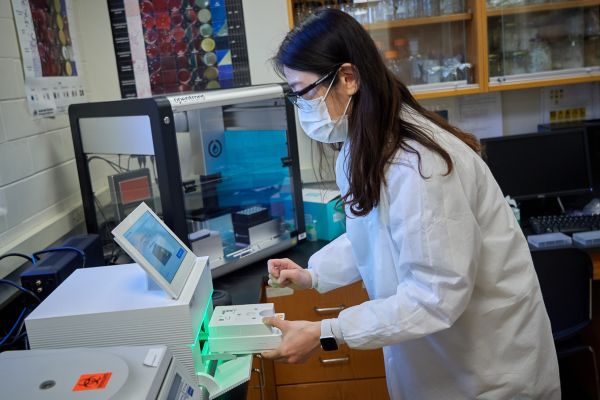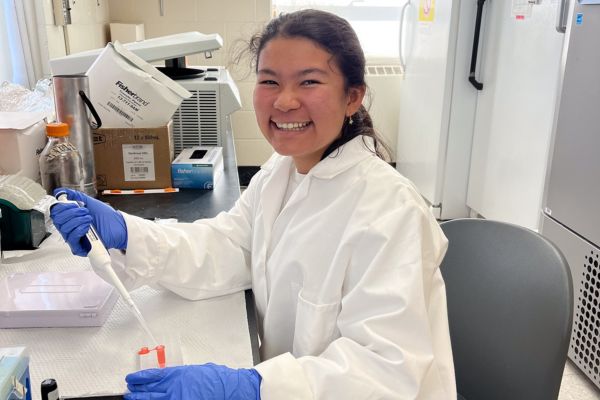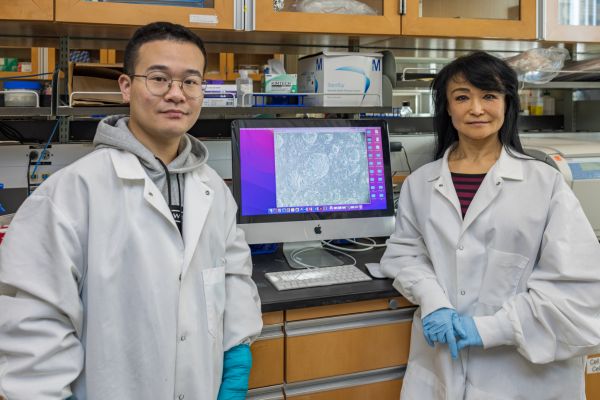Animal Science BS
Animal Biotechnology
Area of Interest
Overview
The Animal Biotechnology area of interest prepares students for employment in the academia and biotech industry as well as to seek further training in graduate programs for agricultural biotechnology or biomedical research. The sequence of courses is structured to enable students to develop knowledge and skills in cellular and molecular biology, epigenetics, biochemistry, and research.
Requirements
Animal Science majors must pass all courses from Group A, at least one course from Group B, at least one course from Group C, and one additional course from either Group B or C. No single class can satisfy more than one requirement.
Every undergraduate student in a baccalaureate degree program in the University, on all campuses, must complete the Common Curriculum. The Common Curriculum requires students to complete six Topics of Inquiry and three Competencies. All students must complete a minimum of 40 credits of coursework approved for the Common Curriculum.
Students must meet a set of requirements established by the college in addition to the University's Common Curriculum requirements. For more information, see the College of Agriculture, Health and Natural Resources section of the Undergraduate Student Catalog.
Sample Four-Year Plan
This is an example schedule for planning purposes only and is meant to be a guide for students and advisors. 120 credits total needed to complete degree. For official degree information, please contact the Degree Audit section of the Office of the Registrar and speak with your advisor.
- ANSC 1001: Introduction to Animal Science (3 Credits) — The biological, physical, and social factors that influence animal production and utilization.
- BIOL 1107: Principles of Biology I (4 Credits) — Designed to provide a foundation for more advanced courses in Biology and related sciences. Topics covered include molecular and cell biology, animal anatomy and physiology. Lab exercises include dissection of preserved animals. CA 3-LAB.
- Information Literacy (4 Credits): To satisfy the Information Literacy requirement, students must pass at least one of the following: ENGL 1007 (Seminar and Studio Writing and Multimodal Composition), ENGL 1010 (Seminar in Academic Writing), ENGL 1011 (Seminar in Writing through Literature).
- UNIV 1810: Animal Science Learning Community (1 Credit) — A course designed to assist students in adjusting to the University of Connecticut and to improve academic performance. Students will be exposed to UConn resources and facilities, enhance their academic and interpersonal skills, and learn strategies for problem solving and time management.
- Common Curriculum Course (3 Credits)
- ANSC 1111: Principles of Animal Nutrition and Feeding (3 Credits) — Digestive anatomy of various species and the classes of nutrients including their digestion, metabolism and sources. Nutrient requirements and feeding standards for livestock, companion animals, exotics and aquatics for purposes of reproduction, lactation, growth, work and maintenance. Classes of feedstuffs, their characteristics, proper utilization, formulating rations and nutritional programs for animal enterprise. Taught with SAAS 113.
- BIOL 1108: Principles of Biology II (4 Credits) — Designed to provide a foundation for more advanced courses in biology and related sciences. Topics covered include evolution and population genetics, plant physiology and diversity, animal diversity and behavior, and ecology. CA 3-LAB.
- Select one of the following (4 Credits): CHEM 1122 (Chemical Principles and Applications), CHEM 1124Q (Fundamentals of General Chemistry I), CHEM 1127Q (General Chemistry I).
- STAT 1100Q: Elementary Concepts of Statistics (4 Credits) — Standard and nonparametric approaches to statistical analysis; exploratory data analysis, elementary probability, sampling distributions, estimation and hypothesis testing, one- and two-sample procedures, regression and correlation. Learning to do statistical analysis on a personal computer is an integral part of the course.
- Common Curriculum Course (3 Credits)
- PATH 2100: Anatomy and Physiology of Animals (4 Credits) — A study of the anatomy and physiology of animals with reference to pathological changes of the component parts of the body.
- ANSC 3121: Principles of Animal Genetics (3 Credits) — Principles of Mendelian and molecular genetics. Biosynthesis and function of DNA, RNA, and protein. This course also includes introductions to population and quantitative genetics. Information on molecular methods of genetic analysis and examples of genetics in animals of agricultural significance are also provided.
- CHEM 2241: Organic Chemistry (3 Credits) — An abridged course in organic chemistry designed to provide a background for related fields in which a general rather than a detailed knowledge of the compounds of carbon is required.
- MCB 2210: Cell Biology (3 Credits) — Structural organization of cells and the molecular basis of dynamic cellular processes, with emphasis on eukaryotic cells. Topics include protein targeting, vesicle trafficking, cytoskeleton, cell-cell interactions in tissues, and the molecular basis of related human diseases. Intended to be taken before MCB 2000 or 3010.
- Common Curriculum Course (3 Credits)
- ANSC 3122: Reproductive Physiology (4 Credits) — A study of the reproductive anatomy and physiology of domestic animals. Laboratory will include macro and micro anatomy, hormone action, and techniques used in reproductive management of domestic animals.
- ANSC 3194: Career Paths in Animal Science (1 Credit) — A discussion of current employment opportunities in animal sciences. In addition, students will prepare resumes and make oral presentations.
- Group B ANSC Elective Course (3-4 Credits)
- MCB 2000: Introduction to Biochemistry (4 Credits) — The structure, chemistry, and metabolism of carbohydrates, lipids and proteins. Enzyme function and kinetics, energy metabolism, and structure and function of nucleic acids. A survey course for students of agriculture, general biology, medical technology, nursing, and pharmacy. Molecular and Cell Biology majors, biophysics majors, and other students desiring a more intensive introduction or considering advanced course work in biochemistry or molecular biology should take MCB 3010.
- Common Curriculum Course (3 Credits)
- MCB 2610: Fundamentals of Microbiology (4 Credits) — Biology of microorganisms, especially bacteria. Cellular structure, physiology, genetics, and interactions with higher forms of life. Laboratory familiarizes students with methodology of microbiology and aseptic techniques.
- Group B/C ANSC Elective Course (3-4 Credits)
- ANSC 3323: Animal Embryology and Biotechnology (3 Credits) — Introduction to recent research in animal embryology and related reproductive biotechnologies. Basic principles, methodology and state of the technology for numerous established and emerging animal biotechnologies such as transgenesis and cloning.
- PATH 2200: Modern Biomedical Laboratory Techniques (3 Credits) — Comprehensive project-based laboratory course utilizing a variety of modern biomedical techniques to identify an unknown pathogen and express antigens for vaccine and diagnostic assay development. Topics covered include next-generation sequencing, CRISPR gene editing, mRNA technology, gene cloning and expression, protein purification and analysis, immunoassay, and reverse transcription quantitative PCR development.
- Common Curriculum Course (3 Credits)
- Group B/C ANSC Elective Course (3-4 Credits)
- Group B/C ANSC Elective Course (3-4 Credits)
- PATH 3401: Immunobiology (3 Credits) — Principles of basic and clinical immunobiology; phylogeny and ontogeny of the immune response, characteristics of the immune response, cellular and humoral immunity; central and peripheral lymphoid tissues; mechanisms of immunologic injury and immunologic diseases; comparative and veterinary immunology; transplantation and tumor immunology.
- Common Curriculum OR Elective Course (3 Credits)
- MCB 2410: Genetics (4 Credits) — Foundational principles of classical genetics and modern genomics with a focus on eukaryotic model genetic organisms. Emphasis on molecular mechanisms underlying heredity. Intended for majors in MCB and related disciplines.
- ANSC W* OR Elective Course (1-3 Credits)
- Group B/C ANSC Elective (3-4 Credits)
- MCB 3412: Genetic Engineering and Functional Genomics (3 Credits) — Methods and applications of genetic engineering, including gene manipulation and transfer techniques in prokaryotes and eukaryotes. Emphasis on applications of recombinant DNA technology in the elucidation of gene function. Consideration of recent technological developments in molecular genetics, such as cloning, gene therapy, the patenting and release of genetically engineered organisms, and societal issues related to these developments.
- PNB 2250: Comparative Animal Physiology (3 Credits) — An introduction to comparative animal physiology, emphasizing the evolutionary impacts of diverse physical, chemical, and environmental factors on vertebrates and invertebrates.
- 2000-Level Related OR Elective Course (3 Credits)
*W course must be taken with the corresponding C course.
- ANSC W* OR Elective Course (1-3 Credits)
- Group B/C ANSC Elective Course (3-4 Credits)
- ANSC 5004: Introduction to Data Analysis in Agriculture (3 Credits) — Methods and applications of genetic engineering, including gene manipulation and transfer techniques in prokaryotes and eukaryotes. Emphasis on applications of recombinant DNA technology in the elucidation of gene function. Consideration of recent technological developments in molecular genetics, such as cloning, gene therapy, the patenting and release of genetically engineered organisms, and societal issues related to these developments.
- 2000-Level Related OR Elective Course (3 Credits)
- 2000-Level Related OR Elective Course (3 Credits)
- PNB 3260: Stem Cell Biology (3 Credits) — Principles of stem cell biology and the use and applications of stem cells in research and therapy. Emphasis on molecular, cellular and physiological properties of stem cells, mechanisms of differentiation, use of recombinant DNA technology and application of stem cells in disease models.
*W course must be taken with the corresponding C course.
- ANSC 1602: Behavior and Training of Domestic Animals
- Credits: 3
- Offered: Spring
- Prerequisites: ANSC 1001
- ANSC 2699: Independent Study
- Credits: Varies
- Offered: Fall, Spring
- ANSC 3323: Animal Embryology and Biotechnology
- Credits: 3
- Group: C
- Offered: Fall
- Prerequisites: ANSC 3122 or MCB 4219
- ANSC 5004: Introduction to Data Analysis in Agriculture
- Credits: 3
- Offered: Fall, Spring
- COMM 1100: Principles of Public Speaking
- Credits: 3
- Offered: Fall, Spring
- MCB 2210: Cell Biology
- Credits: 3
- Offered: Fall, Spring
- Prerequisites: BIOL 1107
- MCB 2225: Cell Biology Laboratory
- Credits: 4
- Offered: Spring
- Prerequisites: BIOL 1107
- MCB 2610: Fundamentals of Microbiology
- Credits: 4
- Group: A-3
- Offered: Fall, Spring
- Prerequisites: CHEM 2241 or 2443
- MCB 3412: Genetic Engineering & Functional Genomics
- Credits: 3
- Offered: Fall
- Prerequisites: MCB 2400 or 2410
- PATH 2200: Modern Biomedical Laboratory Techniques
- Credits: 3
- Offered: Fall
- Prerequisites: BIOL 1107 or Equivalent
- PATH 3401: Immunobiology
- Credits: 3
- Offered: Spring
- Prerequisites: BIOL 1107, Previous coursework in Cell Biology
- PNB 3260: Stem Cell Biology
- Credits: 3
- Offered: Spring
- Prerequisites: PNB 2250 or PNB 2274
- SPSS 3230: Biotechnology - Science, Application, Impact
- Credits: 3
- Offered: Fall
- STAT 1100Q: Elementary Concepts of Statistics
- Credits: 4
- Offered: Fall, Spring


